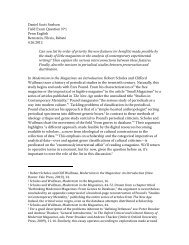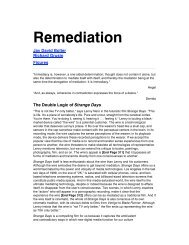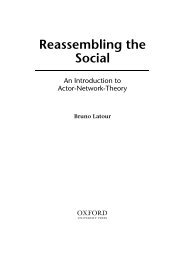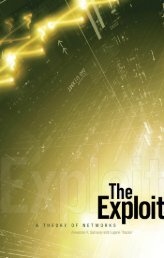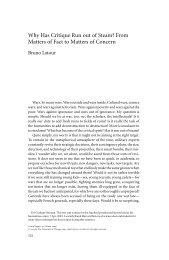Bruno Latour, Aramis, or the Love of Technology, PDF - Dss-edit.com
Bruno Latour, Aramis, or the Love of Technology, PDF - Dss-edit.com
Bruno Latour, Aramis, or the Love of Technology, PDF - Dss-edit.com
You also want an ePaper? Increase the reach of your titles
YUMPU automatically turns print PDFs into web optimized ePapers that Google loves.
If <strong>the</strong> act<strong>or</strong>s in a project define not only <strong>the</strong> o<strong>the</strong>r act<strong>or</strong>s' essencesand desires but also <strong>the</strong> rules f<strong>or</strong> interpretation that make <strong>the</strong>se definitionsw<strong>or</strong>kable, all <strong>the</strong>ir viewpoints have to be deployed in a supple frame <strong>of</strong>reference-a reference mollusk, as Einstein called it in his essay on relativity.Since <strong>the</strong>y <strong>the</strong>mselves establish <strong>the</strong>ir <strong>the</strong><strong>or</strong>ies, <strong>the</strong>ir meta<strong>the</strong><strong>or</strong>ies, andeven <strong>the</strong>ir metameta<strong>the</strong><strong>or</strong>ies, <strong>the</strong> act<strong>or</strong>s have to be left to <strong>the</strong>ir own devices.It's a laissez-faire sociology.Not only does Cohen, <strong>the</strong> f<strong>or</strong>mer head <strong>of</strong> <strong>the</strong> <strong>Aramis</strong> project, saythat team culture and <strong>the</strong> preferences <strong>of</strong> project heads influence technologicalchoices; not only does he reconstruct possible st<strong>or</strong>ies (<strong>the</strong> st<strong>or</strong>y <strong>of</strong> a VALthat he would have directed in Freque's place, <strong>the</strong> st<strong>or</strong>y <strong>of</strong> an <strong>Aramis</strong> tha<strong>the</strong> would have pulled <strong>of</strong>f); not only does he blend cultural and psychosociologicaldeterminism (creativity on one side, rig<strong>or</strong> on <strong>the</strong> o<strong>the</strong>r) withtechnological choices (probabilistic security on one side, intrinsic securityon <strong>the</strong> o<strong>the</strong>r); but in addition, during <strong>the</strong> interview he changes his rule f<strong>or</strong>interpretation, moving from people to <strong>or</strong>ganizational and economic necessities("in any event, Matra could not have done both at <strong>the</strong> same time").And all this in a interview fragment that lasts two minutes and twenty-fiveseconds! What's m<strong>or</strong>e, <strong>the</strong> observer must now <strong>com</strong>pare <strong>the</strong>se variationswith <strong>the</strong> o<strong>the</strong>r interviews-f<strong>or</strong> example, <strong>the</strong> one with Cohen's old classmateFreque. "We really wanted to make an <strong>Aramis</strong> that would be different fromVAL," said Freque. Cohen's answer: "Even if <strong>the</strong>y had wanted to, <strong>the</strong>ycouldn't have"-owing to <strong>or</strong>ganizational necessity (<strong>the</strong>y're too small),financial necessity (it costs too much), psycho-techno-cultural necessity(Freque, influenced by VAL, will never do anything but mini-VAls).Is it impossible, <strong>the</strong>n, to tell <strong>the</strong> st<strong>or</strong>y <strong>of</strong> <strong>Aramis</strong> if all <strong>the</strong> rules diverge,if <strong>the</strong> laws <strong>of</strong> sociology vary with <strong>the</strong> point <strong>of</strong> view and from minute tominute f<strong>or</strong> a given point <strong>of</strong> view? No, because <strong>the</strong> act<strong>or</strong>s also provide<strong>the</strong>mselves with <strong>the</strong> means to pass from one point <strong>of</strong> view to ano<strong>the</strong>r, and<strong>the</strong>y unify, from <strong>the</strong>ir own point <strong>of</strong> view, and each f<strong>or</strong> himself, <strong>the</strong> multiplicity<strong>of</strong> points <strong>of</strong> view thus deployed. Each constructs his own instrument in <strong>or</strong>derto elab<strong>or</strong>ate a synoptic view. All <strong>the</strong> act<strong>or</strong>s thus repair, f<strong>or</strong> <strong>the</strong>mselves, <strong>the</strong>dis<strong>or</strong>der <strong>the</strong>y create by multiplying perspectives.[INTERVIEW EXCERPTS]M. Gontran, a technical adviser in Fiterman 's cabinet. is speaking in his<strong>of</strong>fice at INRETS, with <strong>the</strong> same affability, <strong>the</strong> same sensitivity to subtle variationsTHE 1984 DECISION



